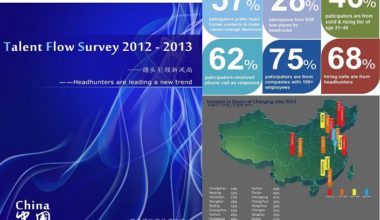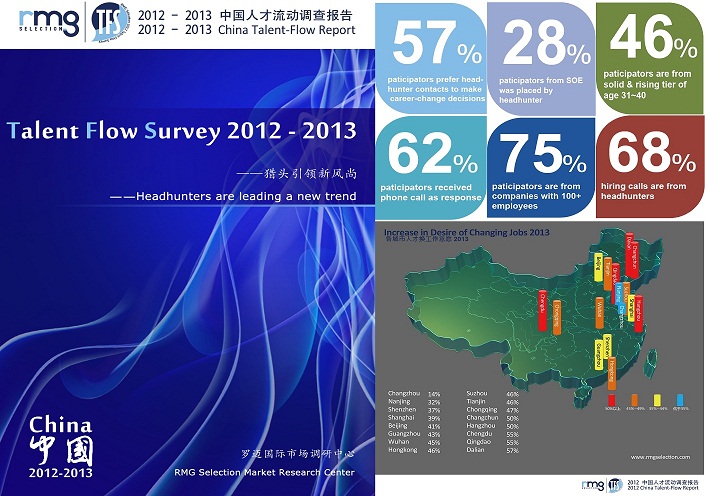The frenzy of news coverage over 6.99 million Chinese college graduates with merely 33.6% contract signing rate up to 1 May, has greatly shocked lots of people. Most blame the low figurefor the economic slowdown, as well as the increasing number of graduates. However, I think these are just superficial reasons under the general macroeconomic situation. What needs to be found out should originate from the root-cause of the dilemma, either from college graduates or recruiting companies.
Like a river fish imagining its fantastic life in the huge ocean, a fresh college graduate has so many expectations or even fantasies for his or her future career in society. When I read a piece of news about graduates looking for jobs in SOEs and public institutions, I was a bit confused. Lots of college graduates expect to, and actually only look for jobs in SOEs and government institutions for the benefits of the so called “iron rice bowl”. In this case, instead of focusing on improving one’s working ability, Chinese college students seem to find a stable job for a lifetime. Another interesting contradiction I noticed is about the salary expectation. According to an online research project, 33% of undergraduates’ salary expectation is between CNY 3,000 and CNY 3,999. Additionally, 20% of students expect CNY 4,000 to CNY 4,999. However, the average monthly salary foreign companies can afford this year is 3,412 Yuan for undergraduates, which is actually the highest compared with other types. As for public units, 2,858 Yuan is what they can pay for an undergraduate on average, which is the lowest among all types. When the dream that a college student dreams is disillusioned, what is left behind are the senses of loss and disappointment. Then why not try to lower one’s expectation in the beginning but end up with a surprise?
Remember that it always takes two to tango! College graduates bear their responsibility, while recruiting companies also have a part to play in this dilemma. I want to mention two points here: Firstly, does educational background matter? Elite universities or 211 and 985 project universities are specifically noted on the job description of quite a few companies. Though these are prestigious universities in China, they do not necessarily have all the elite and intelligent students. There are so many excellent and creative students out there. Therefore, it is time for recruiting units to re-think about the necessity of a ‘famous’ educational background. Secondly, should recruiting companies give opportunities to those who have small defects? I am sure that lots of recruiting companies have met students with hard working attitudes but with less overall intelligence. Whether or not to employ this kind of graduate becomes a real problem. To be honest, based on personal experiences, I prefer hard working ones, and I increasingly cringe when I’m told he or she is ‘very smart’. In the Chinese education system, there is indeed less emphasis on practice compared to the western education system. Therefore, recruiting companies should not expect too much from the fresh graduates in the beginning, but I know a gem with a flaw can be polished as a perfect one with enough time.
Before long, I had an interview with a fresh college graduate who wanted to get a full time offer from my company. I asked about his salary expectation. This boy came up with 5,000 Yuan. He tried to explain the reason with the cost of living in this city like housing and food. To some degree, I understand his argument. However, I barely agreed with it. When hiring a person, a recruitment company pays for what this person can do and bring for the company. I don’t really know companies that set salaries based on the costs of living in a city. When a college graduate looks for jobs, he or she needs to come with the right motivation and attitude, for that is the real value that recruiting companies are expecting.
Though people think 2013 is a tough year for college graduates, personally I think this is still a tough time for companies to recruit too. To get rid of the dilemma, reasonable assessment and a rethinking of the expectations of college students are of course necessary. But at the same time, recruiting companies also needs to make some adjustments. With my recruiting and consulting experience over the past years, I would like to give some tips about the hiring process for the recruiting companies:
Firstly, specific and clear job descriptions should be noted. The necessary requirements, such as CET level 6 and proficiency in Photoshop, should be clearly pointed out in the job description if needed.
Additionally, the job categories should be clearly defined as well. Most college undergraduates are not purely looking for internships. What they really expect is the full time offer after the internship. Therefore, the recruiting companies should tell students who are looking for full time job if they cannot offer the position. In addition, lots of recruiting companies will hold campus recruiting fairs and career talks. It is of great importance for the company to find the right recruiting staff in the jobs fair or career talk. A responsible human resource staff member should get to talk to students who are interested in the job instead of only collecting the resumes. As for the career talk, I would that recommend a working staff member of the company, especially one from that home university, should be invited together with the human resource manager. When students see someone from their university, they feel much freer to ask questions in the interaction session. Recruitment companies have to pay attention to the online application process. Clear steps of the interviews should be informed to every applicant so that students can arrange for the interviews. Moreover, timely replies also play a vital role in this process. As the famous saying goes, ‘time kills all deals’. I think the more time a company takes, the less patience the applicant are left with. Replying to applicants on a regular basis, preferably less than a week later, should be helpful to save the right applicant from walking away. Last but not the least; I would suggest recruiting companies should arrange an on-job mentor for the fresh college graduates in the company. It is not easy for the company to find the right person. In this regard, taking care of the new comer plays an active role in making the students stable at work. New college graduates lack social experience. They really need colleagues who not only guide them at work but help them with socialising in the company as well. Adapting to the working environment quickly can effectively save college graduates from the loneliness.
As I also read news about six government policies for college graduates, I think breaking through the dilemma also requires effort from the government. If recruiting companies can pay more attention to the details in the recruiting process, they will probably get the right people they need. As for college students, expectation is in proportion to hard work. Getting down to earth is the best choice for now!





